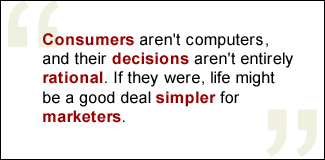Happy brand marriages have a distinctive sound:
 |
"They always deliver. It always gets there on time. Always."
"You feel like their people really care."
"They've made a difference in my life."
"I guess I'm addicted to them."
It's a sound in sharp contrast to that of a brand divorce:
"I used to use them. I wouldn't be caught dead with them again."
Greatness, though it's certainly an enviable achievement, isn't necessarily an enduring one. Great brands can dwindle, losing all semblance of their former glory. Forty years ago, Schlitz beer was challenging Budweiser for marketing leadership in the United States, and Schaefer dominated the New York market. Today, Schlitz and Schaefer have essentially disappeared.
Each brand is called on to demonstrate its excellence not just once, but at every single brand encounter, every day. Inconsistencies in performance can, and will, damage the brand relationship. Customers will forgive an occasional slip, if they see it as an atypical performance-hiccup from a brand they otherwise love. But there's only so much goodwill in the forgiveness bank, even for a great brand; continual withdrawals will result in a depleted account and a spent brand relationship.
Great brands are those that manage to execute their brand promise consistently. They convey and support what some have termed a "package of value" for the consumer. That's a useful concept, but there are two important words included in this descriptive phrase: "package" and "value."
Offering customers a complete package may seem obvious, because no single characteristic can ensure an enduring brand marriage. However, the concept of value requires some additional explanation, because, when companies talk about value, they begin to sound like economists. They see value as some sort of algebraic formula in which the product's price is mathematically compared to the tangible customer need that it is intended to satisfy.
 |
This formulaic emphasis on objective features and tangible needs typifies the way most companies conduct market research. Their researchers ask consumers about the "reasons" why they purchase -- or don't purchase -- certain products. Given this rationally focused approach, consumers' answers tend to dwell on the attributes, features, and rational benefits they receive. The following comments, gleaned from some of our consumer conversations, illustrate these responses:
"If anything breaks, they'll replace it."
"It's dependable."
"It gets the whites very white, and the colors get clean."
"They have well-trained people, and they back up the quality."
"The sale items. And they have the selection."
"They've been around for a while. They've stood the test of time."
"It's a clean store, and the bathrooms are, too."
"Your satisfaction is guaranteed. There are no problems with returns."
But consumers aren't computers, and their decisions aren't entirely rational. If they were, life might be a good deal simpler for marketers, and maybe a whole lot cheaper. Lipstick wouldn't be marketed for its sex appeal and "kiss-proof" qualities. Nike probably wouldn't have to hire Tiger Woods and Michael Jordan to convey what their clothes look like and how their shoes perform. And Ferrari surely wouldn't be tempted to market vehicles costing five times as much as a Honda and with a reported top speed of almost 200 miles per hour.
Ferrari doesn't design its cars with the transportation needs of Los Angeles commuters in mind. It designs its cars with their dreams in mind.